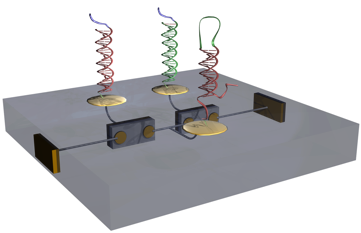
``
Bio-Inspired Technologies
Molecular computation
The interest in combinatorial molecules, such as DNA, as materials for computation stems originally from the potential for massively-parallel information processing. Despite advances, no molecular machine has yet been demonstrated that can compete with the computational power, efficiency, flexibility and reliability of conventional electronics. We are thus investigating hybrid molecular-electronic devices that combine the highly-parallel, low-power computation of molecular machines with the fast and programmable world of silicon-electronics.
For more information see our list of publications or email steven.johnson@york.ac.uk

Recent highlights
On-surface DNA machines
Inherent to the development of a hybrid DNA-electronic computer is the immobilization of DNA machines onto the electronic surface. The immobilization of biological molecules can however have a dramatic impact on their structure and function. We have thus been studying the effect of surface-immobilization on a range of dynamic DNA constructs, namely toehold-mediated strand displacement machines and DNA hairpins. Our experimental studies have shown that the reactions occur much more slowly on-surface than in solution. Furthermore, the displacement reactions do not follow the simple kinetic models used to describe DNA machines operating in solution. We are currently investigating how this can be exploited to provide new ways of processing, storing and encoding information.


